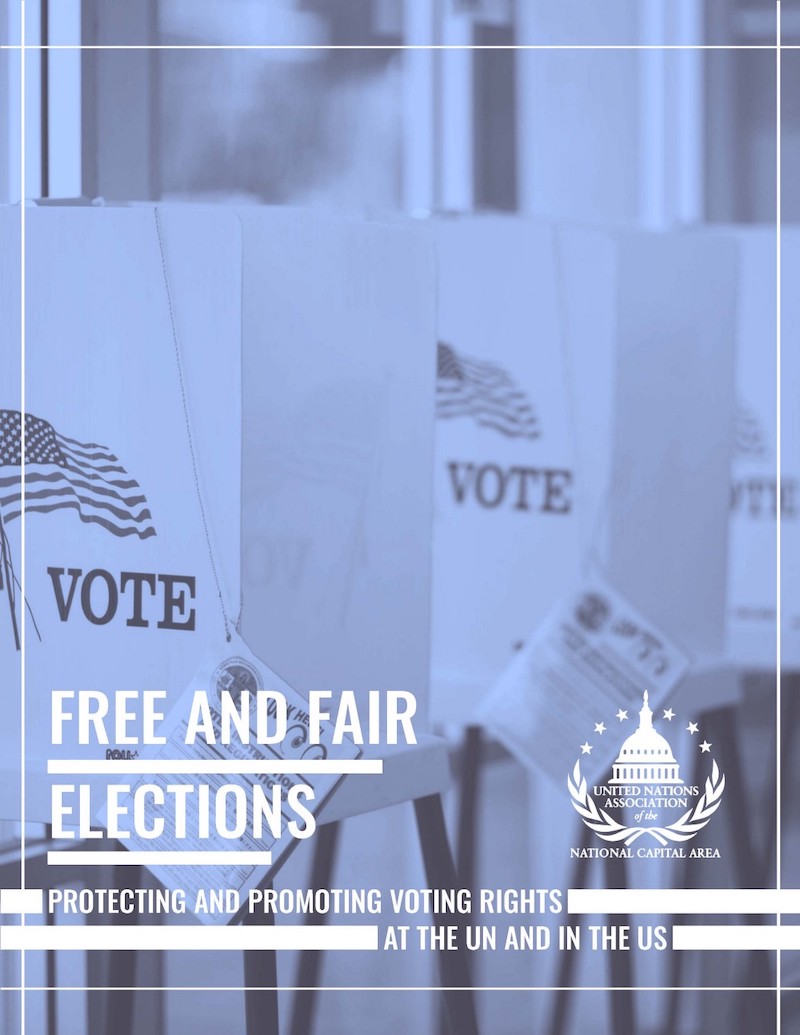Executive Summary
“Building democracy is a complex process. Elections are only a starting point but if their integrity is compromised, so is the legitimacy of democracy.”¹- Kofi A. Annan, former UN Secretary-General
Elections are an essential mechanism for civic participation and allow citizens to hold their leaders to account. Elections are considered an ‘institutional prerequisite’ of democracy; but, far too often, elections “serve merely to give autocratic regimes a veneer of legitimacy.”² Today, for the first time since 2001, over half of the global population live under autocratic rule.³ Electoral integrity is critical to maintaining the public’s confidence in their leaders and preserving the legitimacy of democratic institutions.
Since its inception, the United Nations has played a significant role in providing electoral assistance to Member States.4 Enshrined in Article 21(3) of the Universal Declaration of Human Rights, the UN holds that “the will of the people shall be the basis of the authority of government [and] this will shall be expressed in periodic and genuine elections.”5
From decolonization and democratic transitions to the implementations of peace accords, elections drive positive change. During the late 1950s, the UN supervised and observed referenda that led to the creation of new, independent states. More recently, the UN’s electoral assistance has adapted to changes in the needs of Member States and, from 1991 to 2019, it has provided electoral assistance in over 720 different cases.6
This policy memo aims to provide an overview of the United Nation’s work supporting democratic elections around the world. In the face of new technologies and against the backdrop of rising authoritarianism, global electoral integrity is as crucial now as it is vulnerable. A free and fair election is neither a panacea nor a sufficient substitute for a fully functioning democracy. It does, however, serve as an essential ingredient.
The United States has a long history of voter suppression that continues to this day to weaken its democracy.7 Stringent voter identification laws and partisan gerrymandering, or the practice of manipulating district boundaries to benefit a specific political party, leave millions of U.S. voters disenfranchised.8 The 2020 November General Election faces additional threats to its legitimacy, including the proliferation of digital misinformation, the threat of foreign interference, and the unprecedented challenges of the COVID-19 pandemic.9
Building on the principles enshrined in the International Covenant on Civil and Political Rights (ICCPR), civil society must continue to advocate for more inclusive and genuine elections. This policy memo concludes with several recommendations for civic engagement and action to advance and defend democratic processes.
Learn More
Citations
“Global Commission on Elections, Democracy & Security,” Kofi Annan Foundation.
[See: Dahl, Robert A. Polyarchy; Participation and Opposition, New Haven: Yale University Press, 1971.]; “Supporting Elections and Democracy,” Kofi Annan Foundation:
Lührmann, A., Maerz, S. F., Grahn, S., Alizada, N., Gastaldi, L., Hellmeier, S., ... & Lindberg, S. I. (2020). Autocratization Surges–Resistance Grows. Democracy Report 2020. Varieties of Democracy Institute (V-Dem).
Halff, M. (2017, September). The United Nations approach to electoral management support. In Annual Conference of the European Consortium for Political Research (ECPR) Oslo.
UN General Assembly “The Universal Declaration of Human Rights,” 10 December 1948, (General Assembly resolution 217 A).
United Nations Department of Political Affairs (DPPA), “United Nations Electoral Assistance,” United Nations General Assembly [A/74/285], 06 Aug 2019:
Mckeever, Amy (2020, August 21)“Voter suppression has haunted America since it was founded,” The National Geographic.
American Civil Liberties Union (2020, February 3). “Block the Vote: Voter Suppression in 2020,” ACLU.
Day, Chad and Alexa Corse (2020, September 5) “Voters Face a Complicated Election as the Pandemic Remakes Voting,” The Wall Street Journal.
Dahl, Robert. (1971) Polyarchy; Participation and Opposition. New Haven: Yale University Press.









